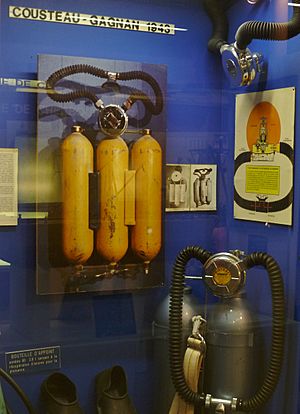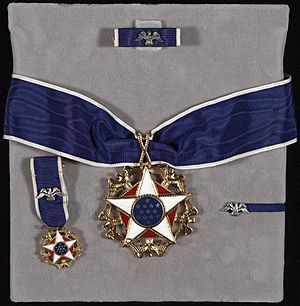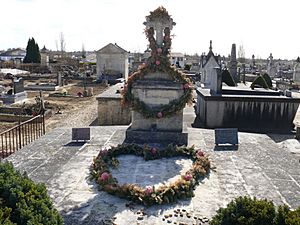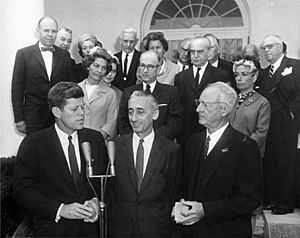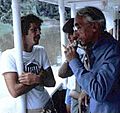Jacques Cousteau facts for kids
Quick facts for kids
Jacques-Yves Cousteau
|
|
|---|---|
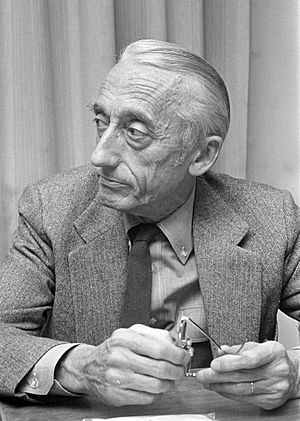
Jacques-Yves Cousteau in 1972
|
|
| Born | 11 June 1910 |
| Died | 25 June 1997 (aged 87) Paris, France
|
| Cause of death | Heart attack |
| Resting place | Saint-André-de-Cubzac, France |
| Nationality | French |
| Occupation | Oceanographer |
| Spouse(s) | Simone Melchior Cousteau (m. 1937-1990, her death) Francine Triplet Cousteau (m. 1991-1997, his death) |
| Children | 4, including Jean-Michel and Philippe Cousteau |
Jacques-Yves Cousteau (11 June 1910 – 25 June 1997) was a French naval officer, explorer, ecologist, filmmaker, scientist, photographer and researcher who studied the sea and all forms of life in water. He co-developed the aqua-lung, pioneered marine conservation and was a member of the Académie française.
He is generally known in France as le commandant Cousteau ("Commander Cousteau"). Worldwide, he was commonly known as Jacques Cousteau or Captain Cousteau.
Life
Cousteau was born in Saint-André-de-Cubzac, Gironde, to Daniel (a lawyer) and Élisabeth Cousteau. In 1930 he entered the French Navy as the head of the underwater research group. He later worked his way up the ranks as he became more famous and more useful to the navy.
In 1937 he married Simone Melchior, by whom he had two sons, Jean-Michel (1938) and Philippe (1940). In 1991, one year after his wife Simone's death of cancer, he married Francine Triplet. They already had a daughter Diane Cousteau (1980) and a son Pierre-Yves Cousteau (1982), born before their marriage.
Cousteau died at the age of 87 of a heart attack while recovering from a respiratory illness. He is buried in the Cousteau family plot at Saint-André-de-Cubzac Cemetery, Saint-André-de-Cubzac, France.
Marine exploration
According to his first book, The Silent World, Cousteau started skindiving—with a mask, snorkel, and fins in 1938. In 1943, he tried out the first prototype aqua-lung,—designed by Cousteau and Émile Gagnan, which made lengthy underwater exploration possible for the first time.
Before the abilities of "porpoises" were officially discovered, Cousteau suggested that they might exist. In his first book, The Silent World he reported that his research vessel, the Élie Monier, was heading to the Straits of Gibraltar and noticed a group of porpoises following them. Cousteau changed course a few degrees off the optimal course to the center of the strait, and the porpoises followed for a few minutes, then diverged toward mid-channel again. It was obvious that they knew where the optimal course lay, even if the humans didn't. Cousteau concluded that they had something like sonar, which was a relatively new feature on submarines. He was right.
Marine conservation
In October 1960, a large amount of radioactive waste was going to be discarded in the sea by the European Atomic Energy Community. Cousteau organised a publicity campaign which gained wide popular support. The train carrying the waste was stopped by women and children sitting on the railway, and it was sent back to its origin. The risk was avoided.
In 1973, along with his two sons and Frederick Hyman he created the Cousteau Society for the Protection of Ocean Life, Frederick Hyman being its first President; it now has more than 300,000 members. 1977, together with Peter Scott, he received the UN International Environment prize.
In 1985, he received the Presidential Medal of Freedom from Ronald Reagan. 1992, he was invited to Rio de Janeiro, Brazil, for the United Nations' International Conference on Environment and Development, and then he became a regular consultant for the UN and the World Bank.
Legacy
Cousteau liked to call himself an "oceanographic technician." He was, in reality, a sophisticated showman, teacher, and lover of nature. His work permitted many people to explore the resources of the ocean.
His work also created a new kind of scientific communication. The simple way of sharing scientific concepts, was soon employed in other disciplines and became one of the most important characteristics of modern TV broadcasting.
In 1975, folk singer John Denver composed the song "Calypso" as a tribute to Cousteau and his research ship Calypso. The song reached the number-one position on the Billboard 100 charts. The French synthesizer composer Jean Michel Jarre created a tropical-themed tribute album entitled Waiting for Cousteau in 1990.
On January 11, 1996, the Calypso was rammed and sunk in Singapore harbour by a barge. Cousteau died on June 25, 1997. The Cousteau Society and its French counterpart l'Équipe Cousteau, which Jacques-Yves Cousteau founded, are still active today.
In 2007 International Watch Co introduced the IWC Aquatimer Chronograph 'Cousteau Divers' Special Edition. The timepiece incorporated a sliver of wood from the interior of Cousteau’s Calypso research vessel. Having developed the diver’s watch, IWC offered support to The Cousteau Society. The proceeds from the timepieces' sales were partially donated to the non-profit organization involved into conservation of marine life and preservation of tropical coral reefs.
The 2004 film The Life Aquatic with Steve Zissou directed by Wes Anderson, is regarded as both an homage to and a send-up of Cousteau's career. It includes an end credit that reads "In memory of Jacques-Yves Cousteau and with gratitude to the Cousteau Society, which was not involved in the making of this film."
Two New Age composers, Vangelis (who was heavily involved with Cousteau in the 1990s) and Jean Michel Jarre, released two albums including original numbers honoring Jacques-Yves Cousteau, titled Cousteau's Dreams (2000) and Waiting for Cousteau (1990), respectively.
Honors
During his lifetime, Jacques-Yves Cousteau received these awards:
- Commandeur de la Légion d'Honneur
- Grand-Croix de l'Ordre national du Mérite
- Croix de guerre 1939–1945
- Officier de l'Ordre du Mérite Maritime
- Commandeur de l'Ordre des Arts et des Lettres
- Honorary Companion of the Order of Australia.
- National Geographic Society's Special Gold Medal in 1961
- BAFTA Academy Fellowship Award - a lifetime achievement award for his movies
Images for kids
See also
 In Spanish: Jacques Cousteau para niños
In Spanish: Jacques Cousteau para niños


